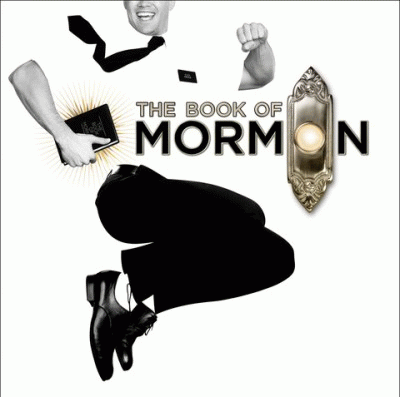Thanksgiving week, my daughter and son-in-law took us to see "The Book of Mormon" in New York City. When first I heard of the plan last summer, I wasn't enthusiastic. A musical comedy about Mormons? Why would we want to see that? Then I heard that the book, music and lyrics were written by Trey Parker, and Matt Stone (of South Park fame) along with Robert Lopez, a co-creator of Cable TV's Avenue Q. That irreverent trio gave me hope. So our family started listening to the soundtrack on CD. The music turned out to be catchy, clever, memorable, and poignant. It left us all humming -- and laughing. The story was funny and moving as well, but somehow still respectful and even reverent. After seeing the play, I realized that "The Book of Mormon" also communicates an insightful understanding of Christianity and its development. Even more importantly, it highlights Mormonism's mythology that reminds playgoers of truths that can indeed change lives -- as Mormons claim.
The "Book of Mormon's" story centers on two young "elders," Kevin Price and Arnold Cunningham. All of us have met these over-sincere 19 year olds, dressed in black trousers, white short-sleeved shirts and black ties. They knock on our front doors regularly. Kevin is the all-American boy -- handsome, energetic, supremely self-confident -- and self-centered. Meanwhile, Arnold is dumpy bespeckled and totally admiring of his companion. The two young missionaries been assigned to Uganda. Neither one of them knows where that country is located or even that it's in Africa. When they realize that their destination is "the dark continent," their minds are filled with "Lion King" images complete with its "Hakuna Matata" problem-free philosophy -- "no worries for the rest of your days."
Instead Price and Cunningham find a completely problem-filled culture. They're told there are war, poverty, and famine. There's drought; eighty percent of the people have AIDS; and young girls are forced to get circumcised. In the meantime, Ugandan men are busy raping virgins and even babies on the belief that such intercourse will cure their AIDS. The people's response? Far from "Hakuna Matata," it's "Hasa Diga Eebowai" -- "F_ _ k you, God!"
The All-American, Elder Price, is turned off by such blasphemy and by the resistance of Ugandans to Mormonism. Soon he's checked out for the more comfortable make-believe of Orlando's Disneyworld, Meanwhile, Arnold Cunningham is engaged by Uganda's problems, and finds himself using his empathy and imagination to adapt Mormonism the problem of female circumcision.
Despite claims that he's "making things up again," Arnold claims to discover that Joseph Smith actually did address the problem of clitorectemy. All of this brings him close to the lovely Nabulungi, whom he initiates into the Latter Day Saints' community. She and Arnold's double entendre duet, "Baptize Me," turns out to be a wonderfully moving love song.
The musical ends with Ugandans being converted to the faith of Latter Day Saints -- but to a version that's fully adapted to their reality. Their concluding number, "Hello" reprises the play's opening song, but this time in Ugandan form meaningful to an exploited and poor people who long to be freed from war. Besides this, Arnold Cunningham has become a key figure for the converts on a par with Joseph Smith and Brigham Young.
The Arnold Cunningham story is really the reversal of Christianity's story and its development over the centuries. In effect, the historical Jesus was a Ugandan -- poor, oppressed, a "marginal Jew" on the edge of empire, out of sight, out of mind to the world's movers and shakers. Then empire and its hangers-on elevated him to the status of "the Christ." He became Europeanized addressing concerns he never centralized -- like the after-life's heaven and hell. Finally, he was Americanized as the champion of the U.S. version of a "City on a Hill." Only with the advent of liberation theology and the Jesus Seminar was the historical Jesus rescued and rediscovered in his identity as empire's victim, not its champion. That in itself is a fascinating story -- too long to pursue here.
Here though it is appropriate to celebrate the insights preserved in the mythology of Mormonism that "The Book of Mormon" centralizes. It's actually a beautiful myth -- the story of a man with the most ordinary name possible, Joe Smith -- obviously an "everyman." This average Joe finds riches right in his backyard -- gold out there under a tree. It's like the rabbinic tale of the prayer-shawled Jew walking the floor of his tiny cabin praying for riches, while beneath the path he's tracing on his floor lies a strongbox filled with treasure.
Actually, Joe Smith finds a great deal more than gold. For right in his own backyard he discovers that a revelation from God has been written on the golden tablets he finds. The revelation tells how Jesus Christ, the very Son of God, belongs to every culture -- even to a late comer like the United States. Jesus actually came to America, Joe finds out. All life began here. Paradise was actually in Missouri somewhere.
What could be more meaningful (and true) than that? Treasure in your backyard; revelation close to home; your own land as the center of the earth and history? Like so many myths, it's all true, even if none of it actually happened.
"The Book of Mormon" is well worth seeing -- and thinking about. Taken seriously, its story which blasphemously rejects a God responsible for life's tragedies can really change your life.






